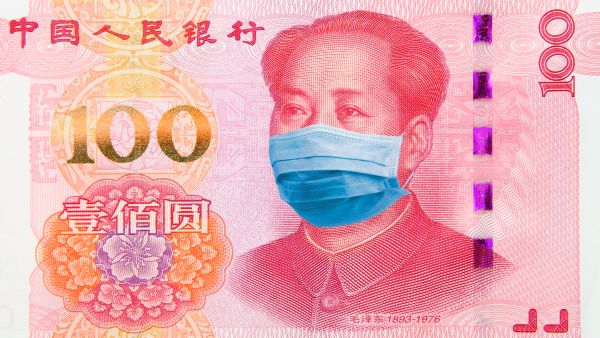Even though the recent outbreak of the new coronavirus has only started last week, economists have been warning of the possible effects it might cause to the global economy, particularly if the disease continues to spread globally over the coming weeks.
The Novel coronavirus is spreading really fast. Please, if you go outside don't forget to bring a mask and wash your hands frequently. It's better to be ready cause this virus is easily transmitted to others. Be safe everyone, especially to my fellow filipinos :( ♡#coronavirus pic.twitter.com/MzIj6vaJvD
— Jaspearl Kaye Villanueva (@jaspearl_kaye) January 26, 2020
Analysts have been trying to predict the possible impact the new coronavirus might pose on the world's economy, based on how sore global markets were following the 2003 SARS outbreak the lasted six months, costing the world about $40 billion.
According to the Chinese government, about 2000 people have been infected by the new coronavirus while 56 people have passed away, most of whom are elderly people with pre-existing conditions.
The recent outbreak is believed to have generated in Wuhan City which is home to more than 11 million people. Chinese officials suspect that illegal transactions of wild animals at the wet market in Wuhan are the direct source of the virus.
Shopping in wet markets?
— World Health Organization (WHO) (@WHO) January 18, 2020
Here are tips to stay healthy
? Wash hands with soap & water after touching animals and animal products
?? Avoid touching ????
❗️Avoid contact with sick animals and spoiled meat
? Avoid contact with stray animals, waste & fluids in market#coronavirus pic.twitter.com/DaPMbakD47
Economists recalled sweeping losses around the world in the aftermath of the SARS outbreak in 2003, warning that the longer the novel coronavirus spreads the bigger global pain will be, especially that the Chinese economy is now significantly larger than it was in 2003.
With few cases of coronavirus recorded around the world, it's still hard to predict the consequences the global economy could suffer because of it. Meanwhile, there are some indicators that can help us foresee the potential impact of the latest outbreak.
Current PRC numbers for the Wuhan Coronavirus.
— Lance Andrews ?? (@LanceAndrews) January 24, 2020
- 835 confirmed cases
- 25 deaths
- 1,072 suspected cases
Currently spreading much faster than SARS.#Coronavirus #CoronavirusOutbreak pic.twitter.com/bLX8u8MuL3
Mortality rate, the duration of the epidemic, and the ease of transmission are among the factors that contribute to how the economy is expected to react, in addition to measures governments will be taking in different parts of the world.
In China, authorities have already advised millions of people to stay at home for the next 14 days, which means transportations services will take a huge hit, in addition to thousands of local businesses that will not be operating for at least the next two weeks.
More than 50 million have reportedly been under a travel ban, as different means of transportation and travel has been stopped, in efforts to contain the current crisis.
Renault, Honda and Peugeot owner PSA Group are among the global companies that have large manufacturing plants in Wuhan, China, the center of a coronavirus outbreak that has claimed dozens of lives https://t.co/VEERNISGqq
— CNN Business (@CNNBusiness) January 24, 2020
Additionally, Wuhan, the city from which the disease originated, is considered the Chinese motor city and is home to a large number of auto plants for international car manufacturers like General Motors, Nissan, Renault, Honda, and others.
The Chinese economy is unsurprisingly expected to suffer the most, especially as it is already tackling the negative impacts of the US-China trade war, with higher debt rates, weak consumer spending, and slow growth already playing into markets.
The outbreak also coincided with the Chinese Lunar New Year, shutting down most celebrations in the Chinese mainland and wreaking havoc on travel and vacation plans for millions of people across the country.
According to The Guardian, Chinese people take up to 3 billion trips to celebrate the holiday with their families every year, but not this year. China Eastern Airlines' revenues fell by about 13% last week alone.
Chinese medics give up new year celebrations to head to #coronavirus quarantine zone https://t.co/LJ0C0GSUDL pic.twitter.com/joujfwmsUE
— CGTN (@CGTNOfficial) January 25, 2020
Consequently, tourism which makes up 11% of the Chinese economy, in addition to travel, hospitality, and other key sectors are bracing for big financial damage during the next few months.
The retail industry in China has also reported financial losses, with Louis Vuitton and Fendi recording a 4.5% loss and Gucci and Balenciaga parent Kering is down by 5%, according to CNN.
But the impact will be felt around the world too. Globally, stock markets have been responding to increasing fears of the disease spreading further away from East Asia.
In the Middle East, Dubai’s main index dropped 0.6% while Abu Dhabi’s ADX General Index fell by 0.3%. Also, oil prices are experiencing decreasing demand, as travel networks are shut in China, and more flights from and to the country are expected to be canceled.
Controlling the new coronavirus outbreak and limiting its geographical scope can help offset some of the global economic damage, but until then, the world should get ready to deal with serious consequences and hope for a quick recovery in the markets.







